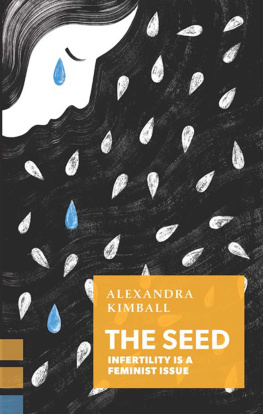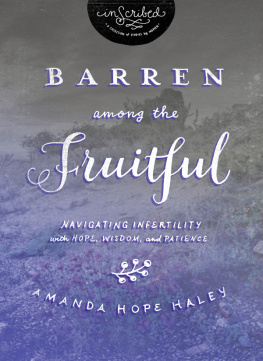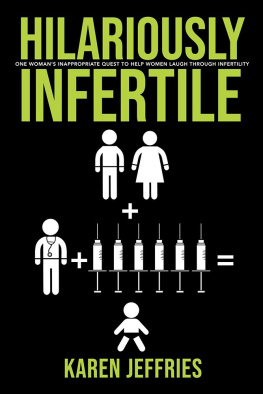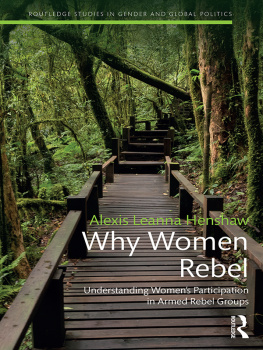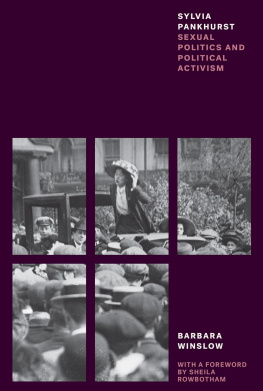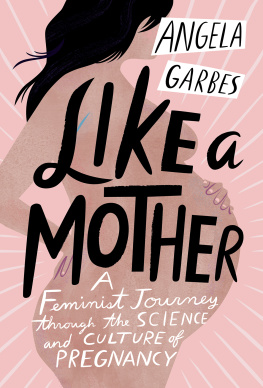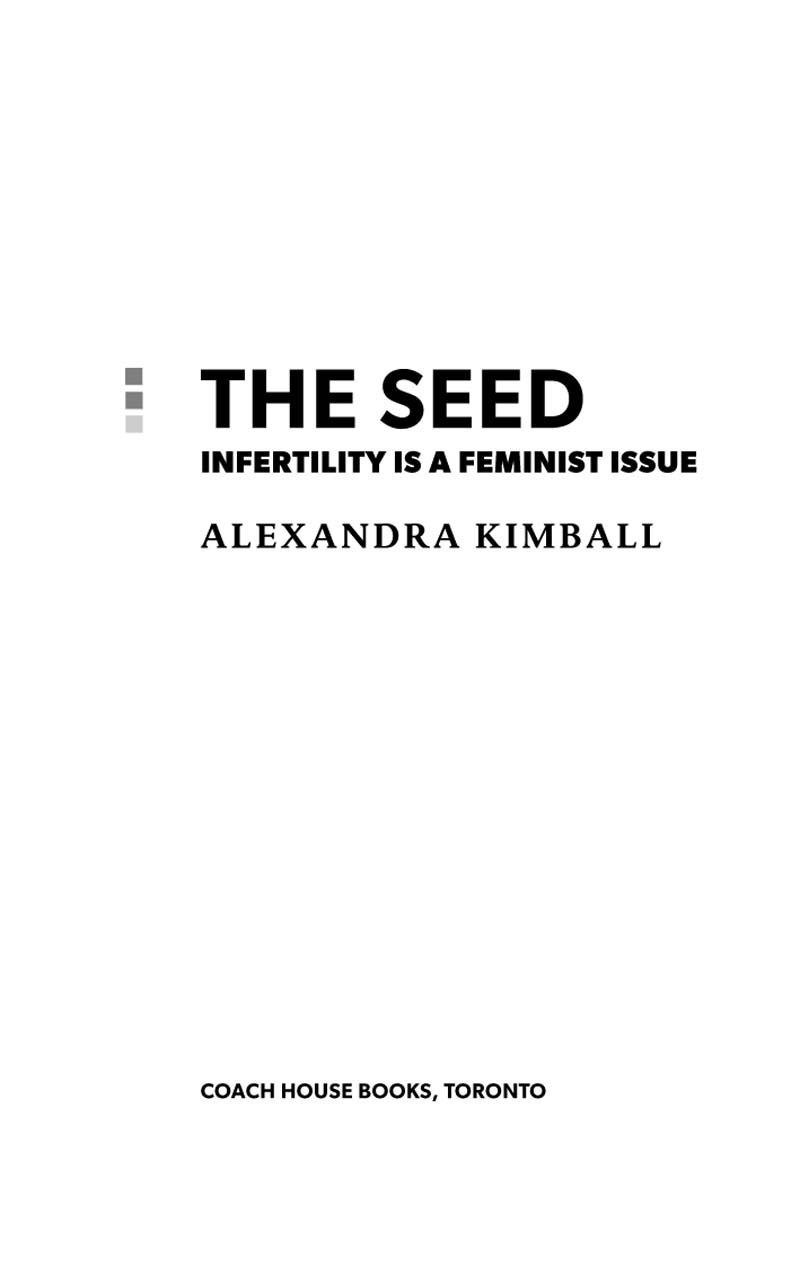copyright Alexandra Kimball, 2019
first edition

Published with the generous assistance of the Canada Council for the Arts and the Ontario Arts Council. Coach House Books also gratefully acknowledges the support of the Government of Canada through the Canada Book Fund and the Government of Ontario through the Ontario Book Publishing Tax Credit.
LIBRARY AND ARCHIVES CANADA CATALOGUING IN PUBLICATION
Title: The seed : infertility is a feminist issue / Alexandra Kimball.
Names: Kimball, Alexandra, 1978- author.
Series: Exploded views.
Description: Series statement: Exploded views
Identifiers: Canadiana (print) 20190053097 | Canadiana (ebook) 20190053135 | ISBN 9781552453858 (softcover) | ISBN 9781770565913 (EPUB) | ISBN 9781770565920 (PDF)
Subjects: LCSH: Infertility, Female. | LCSH: Infertility, FemaleSocial aspects. | LCSH: Infertility, FemalePsychological aspects. | LCSH: Reproductive rights. | LCSH: Feminism.
Classification: LCC RG201 .K56 2019 | DDC 618.1/78dc23
The Seed is available as an ebook: ISBN 978 1 77056 385 8 (EPUB), ISBN 978 1 77056 591 3 (PDF).
Purchase of the print version of this book entitles you to a free digital copy. To claim your ebook of this title, please email with proof of purchase. (Coach House Books reserves the right to terminate the free download offer at any time.)
Introduction
O ne afternoon in the summer of 2017, around when I hit the nadir of my struggle with infertility, I arrived early for a therapy appointment and decided to kill time at a local park. The park was deeply shaded it felt easy to get lost in. On a nearby bench, a man reclined with his head on a ripped knapsack, a cigarette in one dangling hand, and behind a hedge, two teenagers smoked weed, tinny music playing on one of their phones. The two kinds of smoke mingled, dirty-sweet.
On the sidewalk bisecting the park, a woman had stopped with her toddler son. Bub bub, he said, looking at me, pointing with one chubby hand. His mother, a woman about my age, tugged on the boys other hand, trying to get him to move along, but he stayed put. Bub bub, he said again insistently but without any distress. Above his squinted eyes, his faint eyebrows were scrunched. It was an expression of benign resolve, like that of a teacher or bureaucrat tasked with making a point.
Sorry, the woman mouthed apologetically, and I smiled at her, to let her know it was okay. She returned my smile. She had blondish hair pushed back in a ponytail and an ass-centric chubbiness that looked a little awkward a new and unfamiliar body, after recently giving birth. The muchness of her! With a stroller ahead of her, a swollen knapsack on her back, and the child attached to her hand, she spread across almost the entire sidewalk, fore and aft, a whole ecosystem. I knew from mothers Id talked with that there wasnt much comfort in taking up so much space: they felt hypervisible, objects of public scrutiny. But still, they never failed to transfix me. How having a baby seemed to multiply a woman, adding to her not only baby but also baby-stuff; not only enlarging her, but also rooting her to the ground. In contrast, I felt insubstantial, wafting around a park at four on a Monday, shaded by leaves and smoke.
There was a part of me that was surprised they could even see me. Four and a half years and four miscarriages into infertility, I had become very good at being ephemeral. When I was not writing from home, or disappearing into the closed-off exam rooms of fertility clinics, I was online, in any of a dozen or so infertility and miscarriage groups where women like me gathered for advice and support. Yet even though I spent so much time connected to these other invisible women, our connection was so specific, and in such isolation from the rest of our lives, that it felt ultimately tenuous. We knew each other only as diagnoses; as one thing. I often thought of something Nigerian feminist Chimamanda Ngozi Adichie has said about the single story, and where it leads: The single story creates stereotypes, and the problem with stereotypes is not that they are untrue, but that they are incomplete. They make one story become the only story.
If there is a single story of infertile women, its theme is isolation. In roughly half of all cases of infertility defined by the World Health Organization as a reproductively aged, opposite-sex couples failure to conceive after a year of unprotected intercourse the cause can be traced to the male partner. Men suffer emotionally and socially from infertility as well as physically; studies have shown that infertile men experience double the rates of depression and anxiety as their fertile peers. The masculinist ideal, which links manliness not only to virility but to stoicism, compounds mens distress: infertile men tend to disclose their experiences to friends and family members less than their female partners do, with the consequence that they are especially deprived of social validation and support. And yet, the psychological and social burden of infertility is borne largely by women. A review of couples who visited a Swedish fertility clinic found that female patients were at twice the risk as male patients for a major psychiatric disorder at the conclusion of treatment, with special stress in areas of social, sexual, and relationship adjustment. (Multiple other studies have found these risks are higher in childless women compared to those who had previously conceived, and in women with three or more years of infertility compared to fewer, and can remain elevated in women up to twenty years after the conclusion of treatment.) Which is to say that the additional stress of infertility knocks us into a distinct category of psychological concern. In one famous 1993 study, the psychological symptoms of infertile women were compared to those of women diagnosed with other life-altering conditions; their stress levels were found to be equal to those of women living with cancer. Infertile women who are childless are at particular risk: a Danish metastudy found that childless female fertility-clinic patients were 47 per cent more likely to be hospitalized for schizophrenia over their lifetime than patients who eventually gave birth.
This divide between the male and female experience of infertility is no doubt due in part to an unavoidable physical distinction: it is far more invasive, time-consuming, costly, and risky to diagnose and/or treat issues of the internal ovaries or uterus than it is problems originating in the testes. Even for many straight couples facing sperm issues, the only way to conceive may be through in-vitro fertilization (IVF), a procedure that requires a sperm sample from the man, while the woman must endure a month of drugs and monitoring, as well as egg retrieval, which requires minor surgery. But beyond the greater physical commitment, women also take on the social responsibility of infertility. The past century has seen a great expansion of the things that women worldwide are (at least legally) allowed to do and be, but the traditional link between womanhood and motherhood is seemingly intractable. Writing in the New York Times, ex-infertile Shelagh Little explains:
Motherhood is still central to womanhood, the magical thing that womens bodies do. Motherhood is also socially rewarded and is a sort of proxy for femininity. In candid moments, mothers tell you that they liked being pregnant because of all the attention they got. As an infertile, I feel oddly unsexed, especially when I look at pregnant women. I cannot do that (be pregnant), so am I still really a woman? (Thats a hypothetical.)

